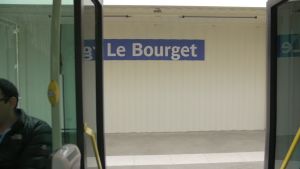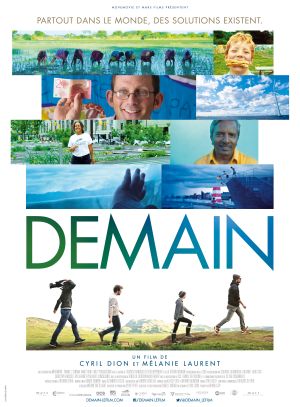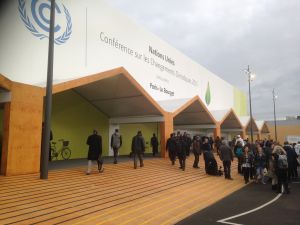Monthly archive for December 2015
Showing results 11 - 13 of 13 for the month of December, 2015.
2 Dec 2015
This shouldn’t take so long as today was, compared to past days, relatively uneventful. Its first half was dominated by the Transition Network website going down, leading to lots of scrabbling around and my being unable to upload various things that I needed to upload. I got to Le Bourget at about 11, and found a corner where, once the website was back up again, I got various things up onto the site. I also sat and wrote a letter to my MP, asking her to vote against bombing Syria (although she clearly will), the last paragraph of which was:
“You said on Twitter that you believe that this intervention will mean that in 5 years, Syria will be more peaceful, and that the risk of terrorism will have been reduced for the UK. I think, with the greatest of respect, that that is utterly delusional. There is no evidence to support that, quite the opposite. I urge you, knowing what a great constituency MP you are, how skilled you are at bringing people together, and that your deep values are those of kindness, reason and a seeking of common ground, to be the one that initiates the breaking of this cycle of endless retribution”.
I also thought that you might like to know what it is actually like inside Le Bourget, made this very short little video impression to just give you a taste of it:
At about 1, I went over to the Climate Generations area at COP21, the civil society zone, which is open to the general public to meet up with other Transitioners, have some food and a catch up.
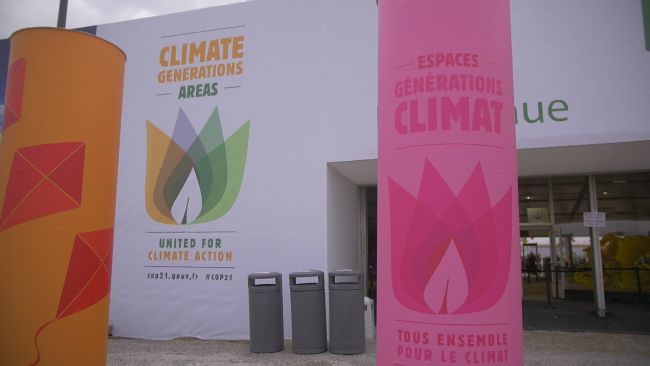
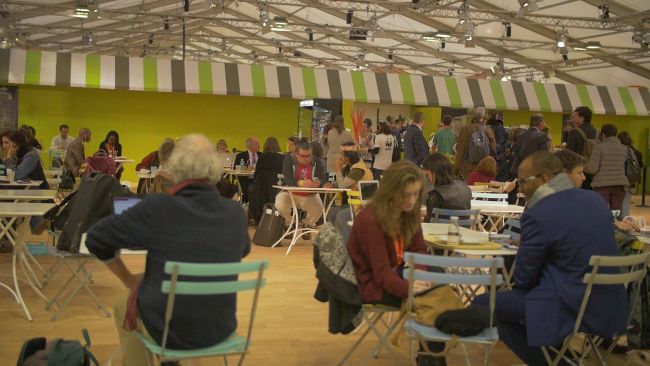
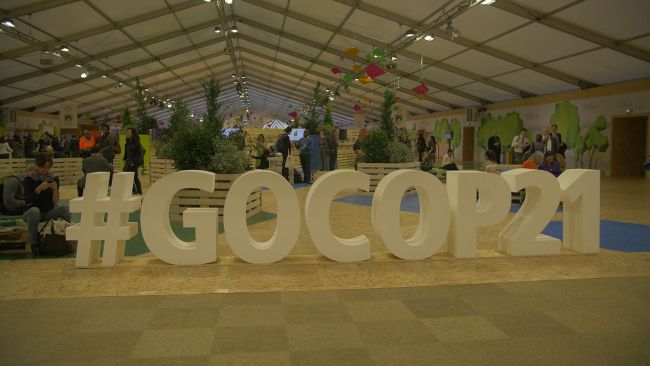
At 4pm there was a second screening of ‘Demain‘ which was also very good on second viewing. This was followed by a Q&A/audience discussion. Here are a few stills from it to give you an impression:
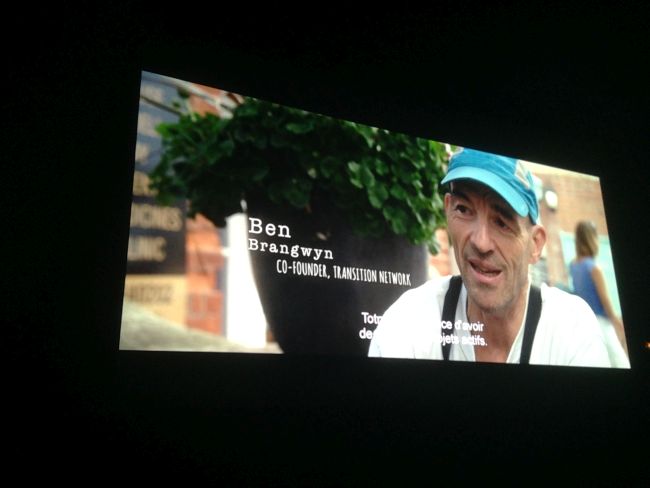
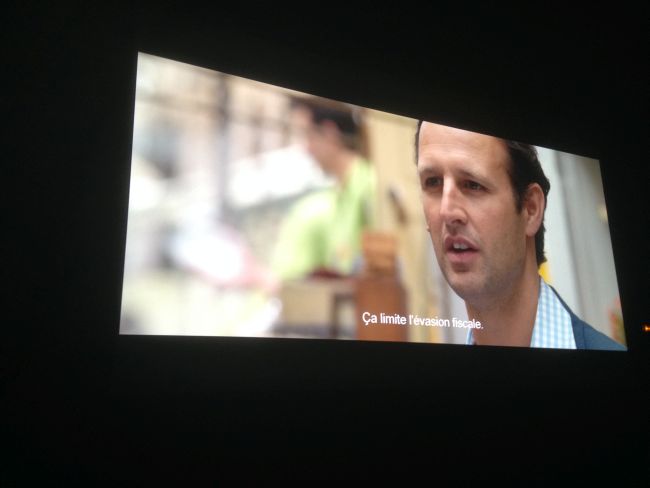
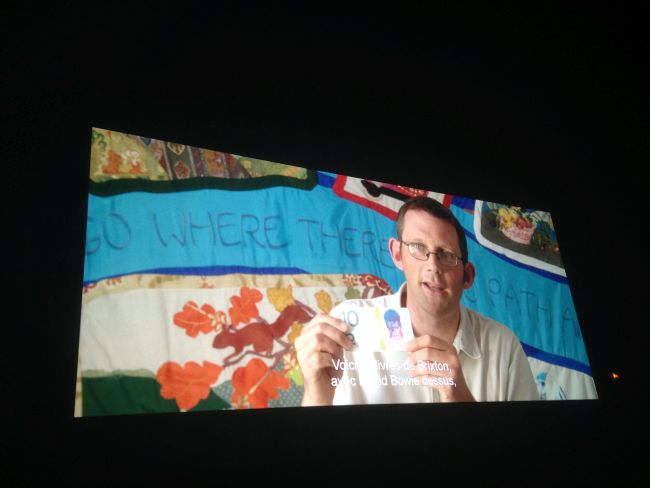
After this, those of us who had appeared in Demain were ushered over to briefly meet with Ségolène Royal, Minister of Ecology, Sustainable Development and Energy, and a very well-known politician in France. We had a group photo taken, and I gave my camera to someone to take a photo, but sadly, when I got my camera back and the group had dispersed, I had been cut off the end of the picture. Here it is:
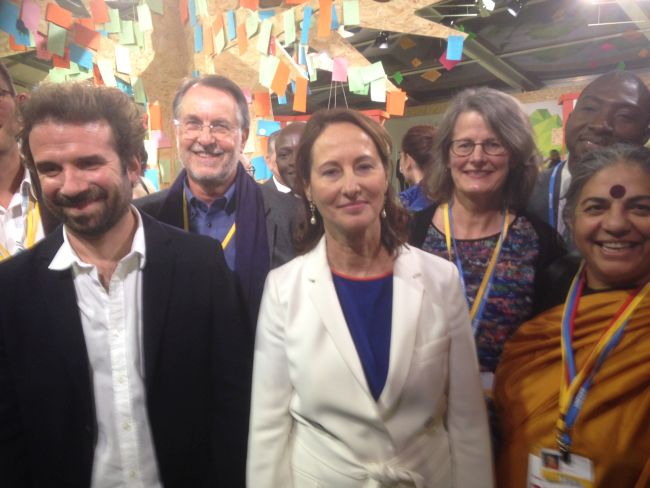
But that’s not really ok, because I was actually there, so here is a mocked up version of what you should actually be looking at here:
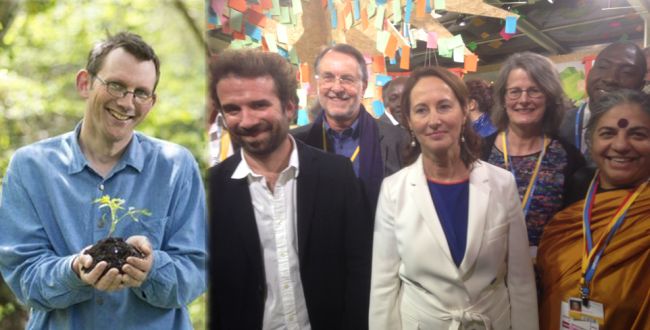
… or perhaps …
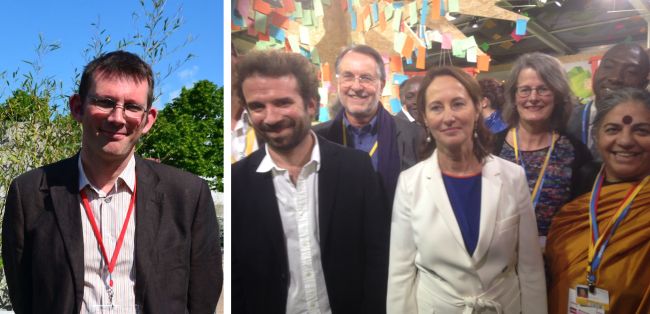
And that was my day really. A train back to town. A pizza with Henry and Filipa. And now back to blog for you with the best of intentions of having something vaguely approaching an early night. It may yet happen … or not. We’ll see. See you tomorrow.
Read more»
2 Dec 2015
Tuesday was kind of a catch up day really, until the evening. I spent most of the day at Place to B near Gare du Nord, catching up with stuff and doing interviews.
Did one of those at about 10 which resulted in the interviewer telling my colleague that not only did he have everything he needed to write a story, but that he was going to go back and start a Transition initiative in his community! Not bad. I like it when that happens.
I also sat down with Emilio Mula who asked how it was going so far, and here’s the discussion we had:
Later, with Transition Network’s Hubs Co-ordinator Filipa Pimentel, we did a radio interview, which you can hear here (in French):
Also, here is the link to a rather good blog with an interview I did on Saturday at the launch of the French version of ’21 Stories of Transition’. So the day was really a mixture of interviews, catching up on emails and welcoming Transition Network’s Delivery Director Sarah McAdam who arrived fresh off the Eurostar to join the team.
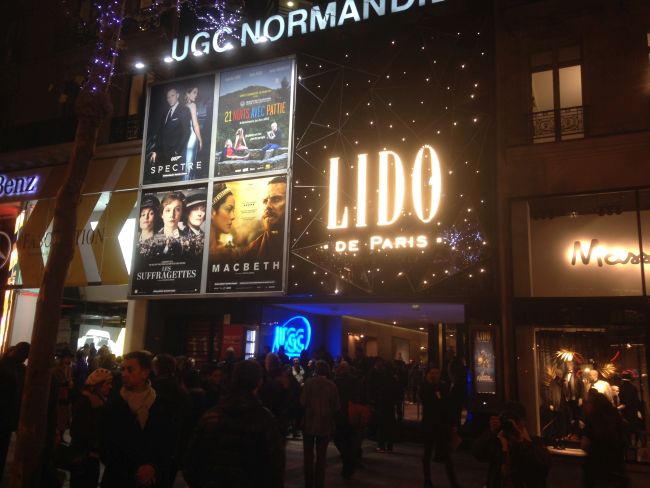
At 6pm a whole bunch of us headed off to the UGC Normandie, one of the largest cinemas in Paris for the Premiere of ‘Demain: the Movie’. Here’s the Transition Network crew just near the cinema:
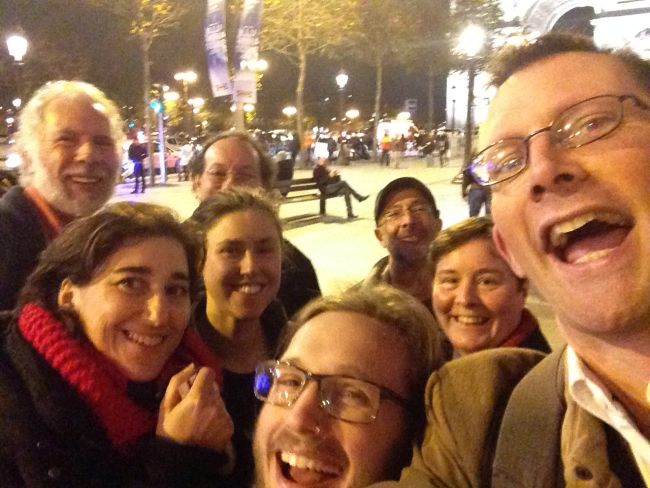
I’ve never been to a premiere before. As I appear in the film (and on the movie poster!) I went to a special door and from there to a special room with some of the other people who appear in the film, as well as the editor, composer and so on.
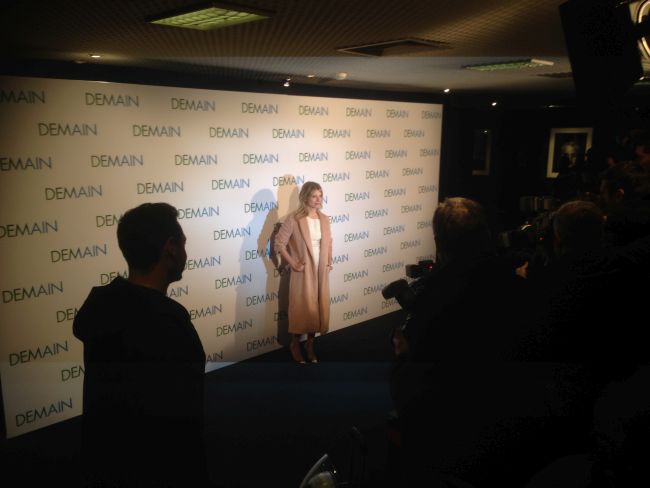
Every now and then, outside the room, there would be lots of shouting and flashing lights. It turned out that, given that it was a premiere, every now and then a famous person would arrive, stand in front of the ‘Demain’ screen, and the gathered press photographers would take lots of photos. This happened a few times, most notably when Mélanie Laurent, who along with Cyril Dion, made the film, turned up.

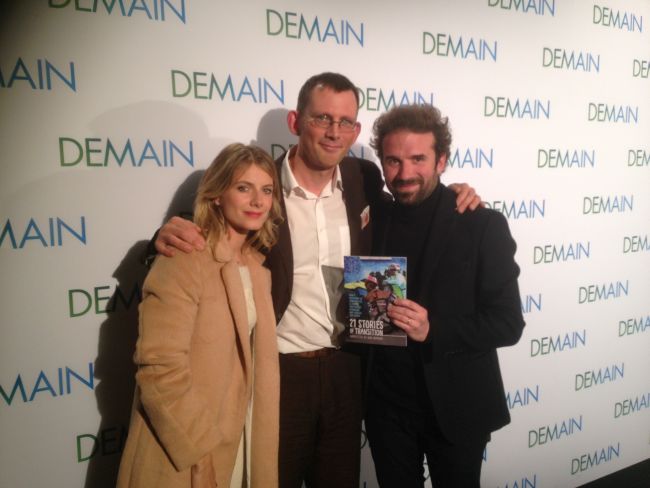
Before the film started, we also all had our photo taken with Melanie and Cyril, and they also very kindly posed with our rather wonderful new book ’21 Stories of Transition’.
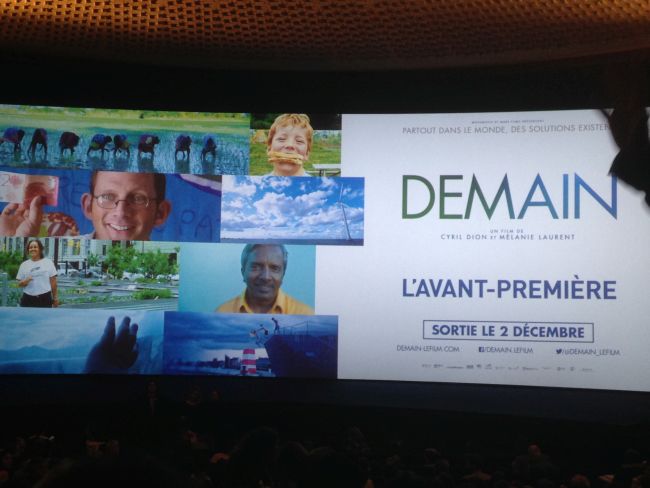
The film was really quite remarkable, and so what follows will comprise a kind of mini review of the film. It was made possible by a community of 10,266 crowdfunders. Here is a very quick sense of the atmosphere inside the cinema before the film began:
The film follows Melanie and Cyril and their film crew friends on a journey around the globe looking for solutions to the crises facing the world. The journey takes them to many different places, and weaves into a moving, powerful and impressive overview of the world that we could create, indeed that is already being created.
It starts looking at food, visiting Todmorden to learn about Incredible Edible Todmorden, as well as visiting Detroit. One woman in Detroit said “we need to figure this out rather than move to the next place, as there are no next places”. What’s happening there in terms of urban agriculture is amazing. The film doesn’t glamourise it, with one urban farmer saying “urban agriculture sounds great on a PowerPoint presentation”.
But in Detroit, urban farming is already creating work and, as the film states, there are still 6000 acres of wasteland that could be used. It’s an amazing look, though, at what can be created in a city, especially one like Detroit, breathing life back into what was a classic industrial monocultural town.
Todmorden shines too. Pam Warhurst, one of the founders, says “we didn’t start out with “let’s save the planet” because that’s far too grand”. Later she says “that’s all the future needs, more people talking to each other”. We visit a remarkable permaculture farm in Normandy, one of whose farmers tells us that “practicing permaculture is far greater than practicing law”. Through their practices, she says, they produce $100 of food per square yard, far out performing industrial agriculture.
‘Demain’ then moves on to energy, with Jeremy Rifkin pointing out that for every 1 degree in temperature, the atmosphere holds 7% more moisture, resulting in the extreme precipitation events we are seeing today. Over the last 450 million years, he pointed out, there have been only 5 great extinctions, and we are now in the 6th, and we’ve created it.
He argues that renewables are moving so fast that they constitute the next Industrial Revolution: “this is a revolution of unprecedented magnitude”, he continues, “how can fossil fuels stay in the game?” The film takes us to Copenhagen, Finland and elsewhere to see renewable energy in place now, making a huge difference now. We see cities where driving a car is the least popular transport choice, for instance in Copenhagen where 67% of commuters no longer drive. As the Mayor of Copenhagen tells the film “we don’t make cities because we want to make cars happy”. We get a real sense of how amazing cities could be.
We visit the amazing Pocheco factory in France (the hugely kind sponsors of the envelopes in which we mail out copies of ’21 Stories of Transition’), a remarkable factory which really models the circular economy in practice. Local economies get great coverage, with Michael Shuman making an appearance, and a trip to the BALLE (the Business Alliance for Living Local Economies) conference. Mark Burton takes them to the beach to talk about where money comes from, I waft a £21 Totnes Pound note at them, and the Bristol Pound gets a good exposure. As one member of BALLE puts it, “if what we have is people power – then we have to use it”.
The film then looks at democracy, at the amazing story of Iceland redesigning its democracy after the financial crisis there, and at a village in India reimagining its political models. “We can all practice politics” someone says at one point.
The last section looks at education, visiting an amazing school in Finland which offers a great model for how to better educate young people than the crap served up to them in most education systems today. The principal at the school says “we use our time for teaching, not testing”. Among other things, they see their role as teaching the students to “love each other”. So rarely do any films about solutions to the climate/environmental/economic/social crises address education. It was a brilliant way to pull all the film’s threads together. The film got a standing ovation.
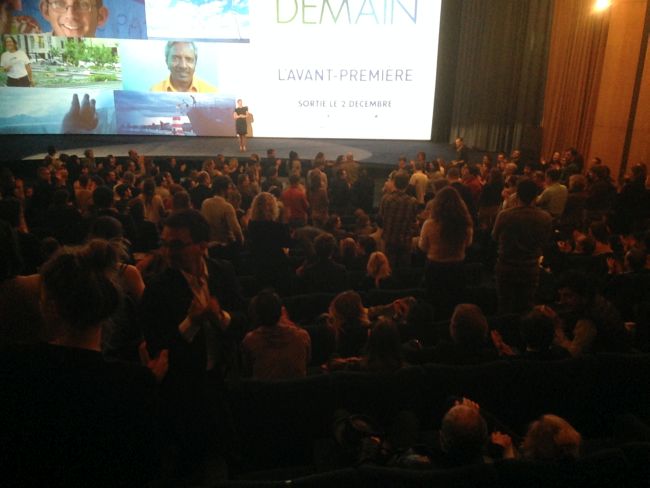
I think it is one of the best films on what the new economy, the new paradigm, looks like. It’s an amazing promo for the Transition movement. It’s passionate, informed, heart-felt, rich and moving. It is carried by the characters in it, and is quite wonderful. I hugely recommend it, and I think it should be shown everywhere. We should all be deeply grateful to Cyril and Melanie for this film. The number of young people in the audience was really striking too.
After the film all of us who were in it went up on stage and each said a few words about the film. I said that it had made me cry a few times and that I was particularly impressed by their following one of the clips of me with a track by the Ramones, who I love dearly.
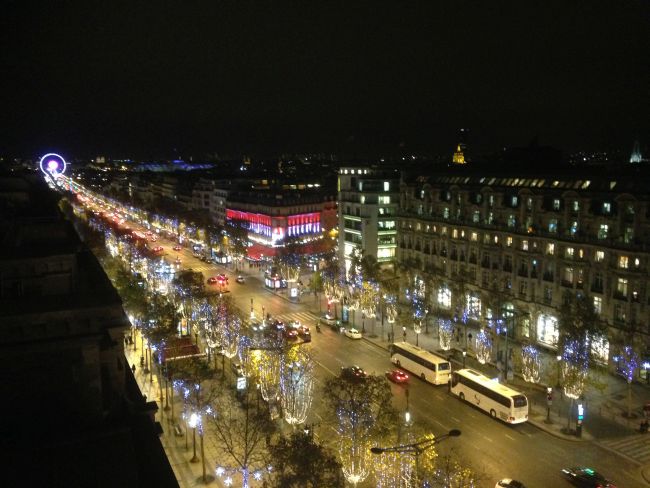
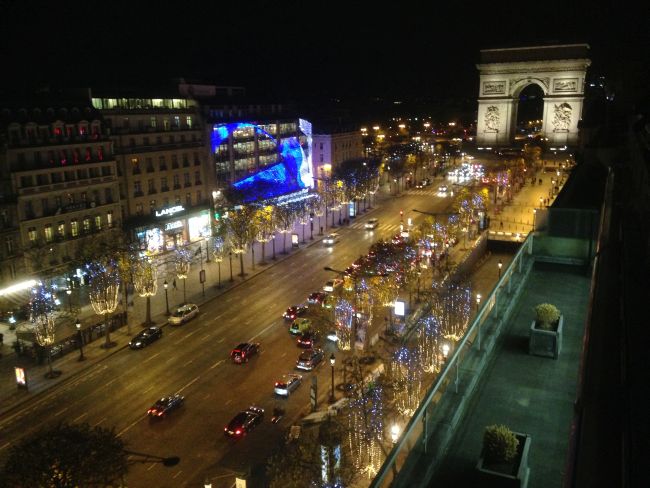
After the event finished, we were invited to the post premiere party, in an apartment overlooking the illuminated Champs Elysees, attended by lots of people involved in the film. It was very glittering and I met lots of very lovely people, all of whom were blown away by the film. Well, as I said, not every day I get to go to the premiere of a movie that I’m in! A magical experience, and one that I will cherish for a long time. My thanks to Cyril and Melanie for creating this film. It screens today at COP21, where it is desperately needed. They have created something that will really accelerate all this work.
Read more»
1 Dec 2015
Today was my first visit to La Bourget, the vast conference centre complex on the edge of Paris where COP21 is taking place. Amid very tight security, helicopters flying overhead, Robocop-style policemen and police on horseback, it certainly felt very different to the events and venues I had been at so far. About 10,000 people were at La Bourget, and today was the opening, and the day when the various world leaders arrived and the whole thing got underway. By the time I made it through all the security, I had missed the opening speeches, but given that they were in French and all the translation headsets were in use, I don’t think I would have got much out of them anyway.
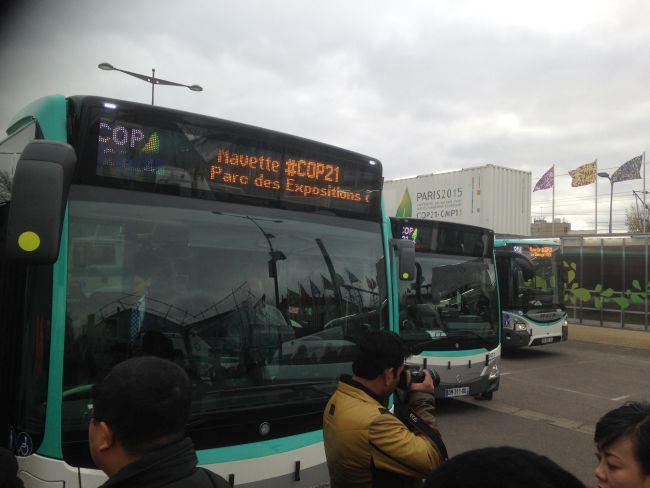
First I saw was Christiana Figueres, Executive Secretary of the UN Framework Convention on Climate Change, who stated that the conference needed to produce “the necessary support for the developing world”. The past year, she said, has been “a turning point” and we are now seeing an “irreversibility in direction”. COP21, she said, needs to produce “agreed milestones and a predictable timetable, that responds to the urgency of the science”. “The world is looking to you”, she said, “the world is counting on you”.
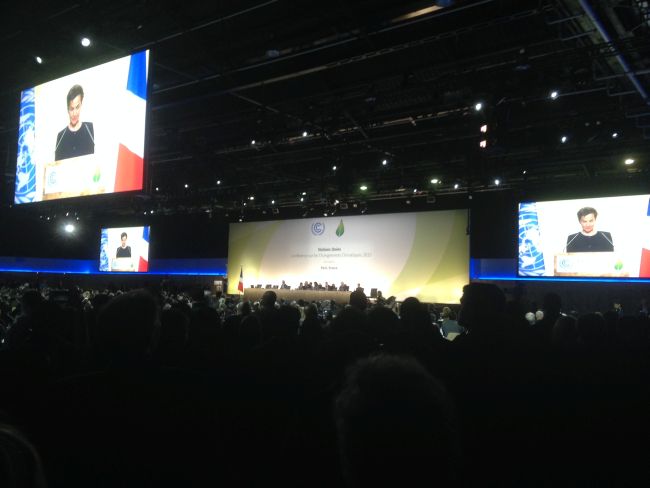
The Prince of Wales spoke next (an odd choice I thought, given that the event is taking place in France), appealing to the delegates to “think of your grandchildren and of those with no voice”. “No one should assume”, he continued, “that for our today, they should give up their tomorrow”. “In damaging our climate” he said, “we become the architects of our own destruction”. As someone responded on Twitter when I mentioned this quote, it was good to see him not passing up the opportunity to mention architects!
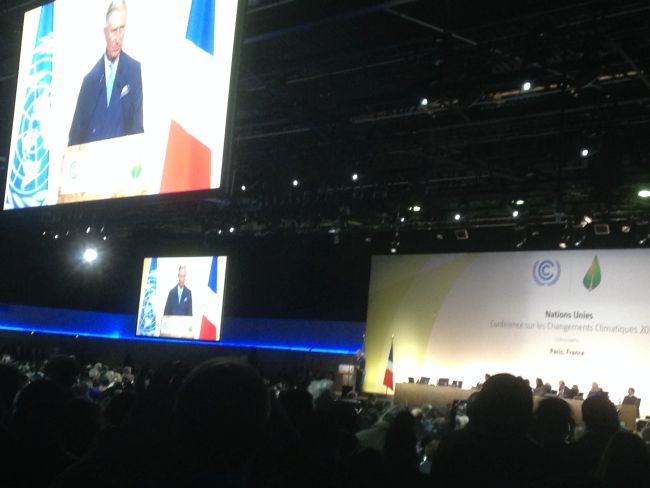
After a couple more speeches in French which went completely over my head due to lack of headset, I was back out into the conference centre. COP21 is vast. Getting a handle on what is happening, where events are and which things you can or cannot get into takes some getting used to. At one point, as the huge crowd made its way out of the opening plenary, I ended up about 4 feet away from Al Gore, wanting to give him a copy of ’21 Stories of Transition’ but couldn’t before the current of the crowd took him away elsewhere.
Each country has its own zone, a space in which to trumpet the good work it is doing for climate change. India wins our ‘Oxymoron of the Day’ award, with its very impressive water projector thing (see video below), trumpeting how it was building the ‘World’s Greenest Airport’:
During this time, over 100 world leaders had 3 minutes each to set out their position coming into the talks. I missed most of them as I was wandering around getting my bearings, but they were interesting. President Obama stated that “One of the enemies we will be fighting at this conference is cynicism – the presumption that we can’t do anything about climate change”. It was a speech that bolstered the idea that he was coming to show leadership and to get the right deal at COP21, one that 350.org cautiously praised, writing “President Obama has lifted up climate change as the great moral issue of our time. Now, he must deliver”.
David Cameron, whose government have done huge damage to the climate reputation of the UK, in a speech replete with all the usual stuff about grandchildren, set his ambitions suitably low by saying that “we need a deal that keep two degrees alive“, not that keeps the world below two degrees. Quite different things. I imagine that quite a few people watched their own leaders and felt, as I did with Cameron, the yawning gap between words and deeds.
Yet something feels very different here. None of that “the American way of life is non negotiable” crap that George Bush turned up at climate summits with. That does now feel very much up for being negotiated. And although I may be being terribly naive, I get a sense here that there is a real determination for this summit not to be the debacle previous ones were.
I spent some time just observing the place. Conferences like this are fascinating things to observe. The wide arrays of national dress among the suits, Peruvian natives with face paint and feathers, women in traditional Singapore dress, Zen monks. And every now and then a fast-moving group of men in dark suits with some President or other in the centre of the huddle. And lots of news crews. Lots. News crews interviewing anyone and everyone in the search for anything they could broadcast about COP21. At one point I went to the toilet, and in the toilets was a news crew, interviewing the rather bewildered-looking toilet attendant woman for her views on COP21! Luckily they didn’t also follow me into the cubicle for a quote.
I went to a session called Fossil Fuel Subsidy Reform: The Missing Piece of the Climate Change Puzzle, promoted by the The Friends of Fossil Fuel Subsidy Reform & The Prince of Wales’s Corporate Leaders Group. It was fascinating. The meeting unveiled the group’s Communique which you can read here. Their basic argument is that fossil fuel subsidy is a form of “negative climate finance”, and that one third of carbon emissions between 1980 and 2010 were directly as a result of subsidies. The argument is usually made that fossil fuel subsidies keep the price of fossil fuels low for consumers, but actually they mostly benefit those who use a lot of fossil fuels (i.e. not the poor), so removing the subsidy and instead using the money to support healthcare, education and renewable energy would be far more skilful.
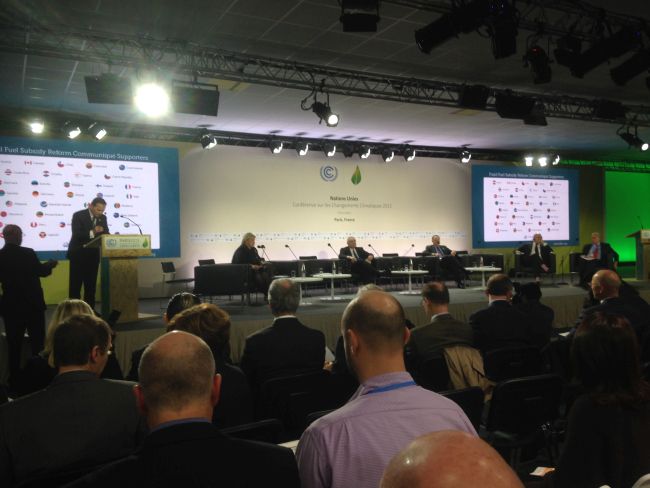
The Communique was presented by the Prime Minister of New Zealand who called for a broad coalition on ending subsidies for fossil fuels, and the list of signatories is already quite impressive. Odd though to see the UK on there, with the UK now being the only country in the G7 to actually increase fossil fuel subsidies. Yet with the leaders of Norway, Sweden, France, the Netherlands, New Zealand and others, as well as leaders froom business, all stressing the importance of this, recognising the the current low oil prices are a great opportunity for reform, it did feel like something very substantial. In the questions at the end, the New Zealand Prime Minister was asked what the deadline was for this, to which he replied “as soon as is practicable”.
On this, the first day of the negotiations, the pledges so far obtained from all the nations would lead to a 2.7 degree increase in world temperature. The next two weeks will show how low the negotiations are able to drive that figure. But much is now different from previous such conferences. Australia and Canada have new governments who are no longer climate sceptics. Canada’s new President, Justin Trudeau, arrived in Paris saying “we’re here to help”. The US and China are now ready to take this seriously, and talk of “phasing out fossil fuels” is now part of the political discource. This short video from the Guardian captures where the optimism comes from and where the unknowns still lie:
As Geoffrey Lean put it, writing in the Telegraph:
“The fact is that, whatever is decided (or not) in the French capital over the next two weeks, the world is now irrevocably embarked on the greatest transition since the Industrial Revolution – towards a low (and eventually no) carbon economy”.
Later that afternoon I went to a less interesting session called the ‘UN Secretary-General’s High-Level Meeting on Resilience‘, which was rather disappointing and which was basically various world leaders, including Egypt’s brutal dictator of a President, Abdel Fattah el-Sisi, talking about the need to adapt to climate change and to build resilience, and also the President of Barbados, who said that “the Carribean cannot build resilience to a three degree world”. Other than that, it was pretty tedious stuff.
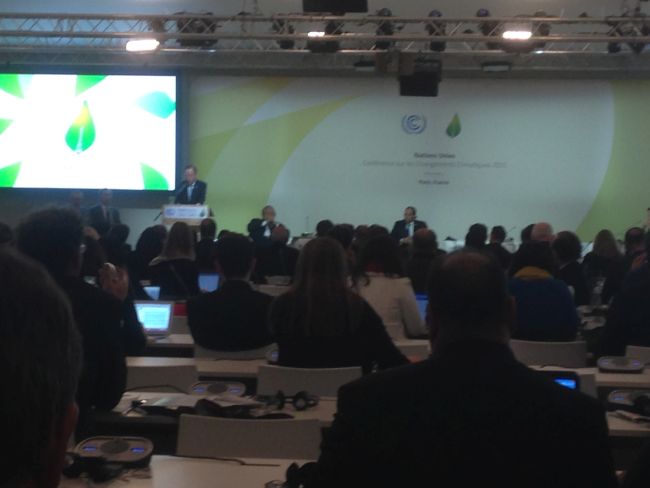
I left feeling curiously positive about it all. No the deal that will be reached in 2 weeks time won’t be enough. But as I wrote a couple of weeks ago, it’s a moment in a flow of change and represents already a huge shift on where we were before. There is much to do, and much negotiating to be done, but I was left with a strong sense of commitment from the event. We’ll see. Given the process of COP, it could still be derailed by relatively few people, but the opening omens are good.
Then it was back onto the shuttle buses and the RER train to head back into Paris. At Place to B, I was to take part in an event called ‘Place to Brief’, a kind of live online webinar discussion-with-an-audience type thing. It featured myself, John D Liu and Barbara Glowczewski, with music by Charlie Winston. I did record it so as to share it with you, but left my recorder at the venue, and the film isn’t yet online, so I will post that in this space when I have it. Very good fun it was, great crowd, good questions, very enjoyable Indian meal afterwards.
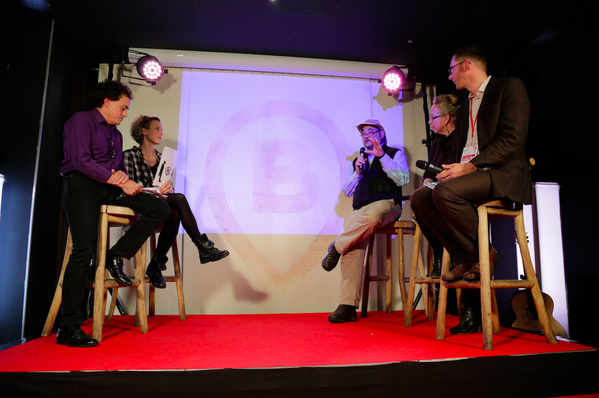
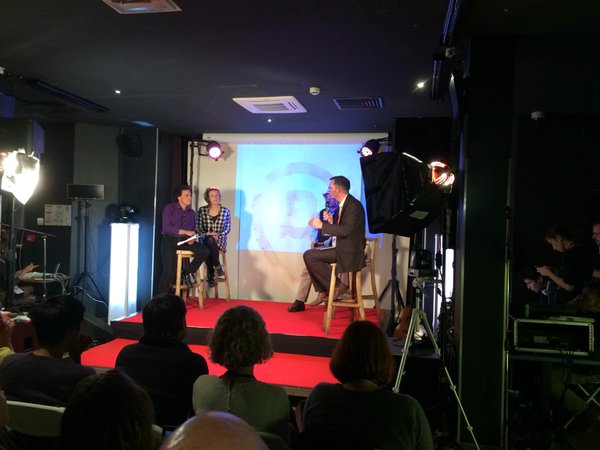
Tomorrow I am going to the premiere of the film Demain (Tomorrow): the movie. There are posters all over the city, and I make an appearance in it wafting a Totnes Pound, and I’ve been stopped a few times by people saying “you’re the guy from ‘Demain‘! So, in advance of me telling you all about that tomorrow, here’s the trailer. Goodnight!
Read more»
